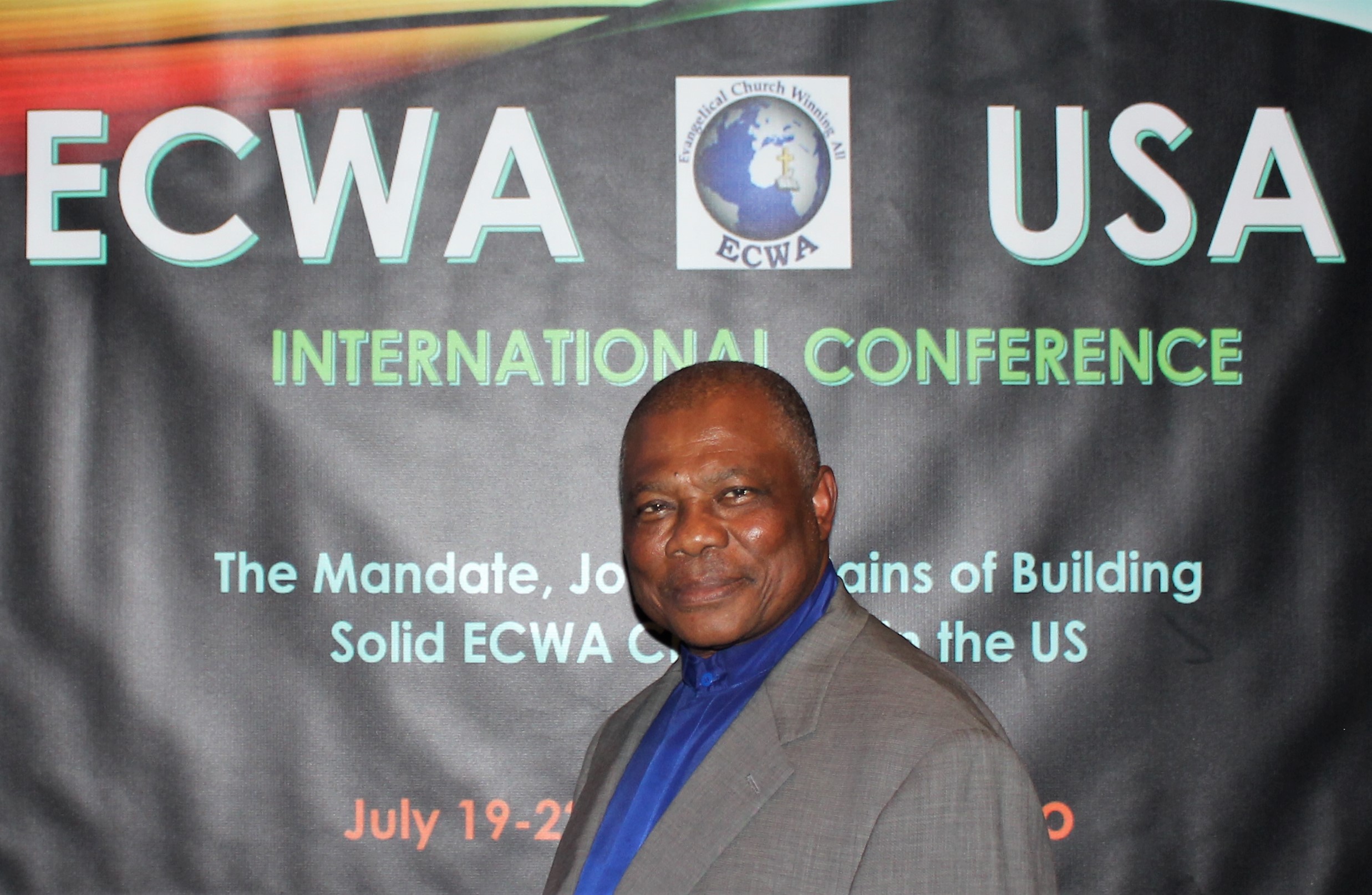
For unavoidable reasons, this pastoral letter is coming out at the end of the month instead of the beginning. Also, the theme is on a different topic, rather than the continuation of the series on the Gifts of the Holy Spirit. The reason for the latter is already indicated in the title of the letter, When God Answers Prayer.
The month of April was observed in ECWA USA as APRIL PRAYER MARATHON. During that period, we had our regular First Sunday Prayer, First Tuesday Prayer and Fasting for Revival, 30 Days Prayer for the Muslim World and Worldwide ECWA Week of Prayer . The last one coincided with the Holy week and Easter celebration. It was during these prayer observances, especially the last one, that some people , including myself began to have some unusual feelings and a few spoke out about the enthusiasm and the warmth of the Week of Prayer activities.
On my part, I was enthused by the sudden influx of new ECWA pastors who participated and indeed facilitated the Week’s activities. There were comments about the blessings received from a particular sermon and the inclusion of live music during the prayer meetings. There was also the announcement that a new prayer cell had just been formed in Minneapolis, MN area. This is just to mention but a few. All this happening simultaneously in one month-all unexpectedly. Like some people say, “ they looked like stuff with which Revival is made” In assessing the surprising scenario, it became obvious that a new thing has happened and is beginning to happen in ECWA USA.
There was sufficient evidence for anyone paying attention to conclude that God has begun to answer our prayers for Revival and for more dedicated workers to share in the vision of ECWA USA. The wind of Revival has begun to blow in the direction ECWA USA. Soon after that period, in my personal devotion, I read Psalm 126. As I did, a chord struck within me. I was prodded that what we witnessed during the APRIL PRAYER MARATHON could be related to the testimony, prayer and hope shared by the psalmist. It soon became a burden for me to share this testimony as an encouragement for us to persist in prayer because there is indeed a God who answers prayer and He has answered ours.
We would now examine this psalm to see how it applies to the above testimony. We would look at it from three dimensions. Psalm 126:1-6
Introduction
Psalm 126 is one of the fifteen psalms variously known as Songs of Degrees, Songs of Steps, Gradual Psalms, Pilgrim Songs or more popularly, Songs of Ascents. There is a common reason for all these various designations. These songs comprise. Psalms 120-134. It is believed that these songs were sung by Jewish Pilgrims as they ascended to Jerusalem three times annually for the three major festivals of Passover, Pentecost and the Tabernacles as commanded by God. Deut.16:16.
Not only were they sung by the Pilgrims, it is also speculated that they were sung by the Levites as they ascended the fifteen steps from the lower level of the Temple to the upper level to carry on their duties.
This joyful Psalm composed after the seventy years of Babylonian captivity is in contradistinction from its counterpart , Psalm 137, also most likely post-exilic (some think it was written during the captivity) which describes their experience in captivity.
The Exposition
Psalm 126 begins with a rapturous ovation for their unexpected and sudden freedom. It seemed that no one expected the timeliness with which King Cyrus ordered the end of the captivity and was immediately followed with a proclamation urging the exiles to return back to the land of Israel (eretz Israel) 2 Chron.36:22-23; Ezra 1:1-4.
Their joyful surprise is expressed in this manner, “ When the LORD brought back the captivity of Zion, We were like those who dream. Then our mouth was filled with laughter, and our tongue with singing”V.1-2a. The amazement of this suddenly regained freedom was not exclusive to the freed exiles, the pagan occupants of the land of Israel marveled as well. These pagans who did not hesitate to show hostility to the returned exiles expressed their wonderment in these words,
“The LORD has done great things for them”. V.2b. The returnees could not agree more, without hesitation, echoed back, “ The LORD has done great things for us and we are glad”.V.3. But it was not all rosy despite this initial excitement and jubilation. The pagan occupants who had probably presumed that the Jews return to the land of Israel is far too remote and a lost cause, soon demonstrated that their admiration was only temporary. Not only did they frown at the rebuilding of the Temple and other infrastructure, they began an active opposition and false allegation against the returnees. The details of this onerous blackmail and intimidation are recorded in Ezra chapter 4. They succeeded in stalling the progress of the work and causing much discouragement to the builders. It took the prophetic encouragement of prophets Haggai and Zechariah to stir up the disheartened returnees to resume and to complete the second Temple . The new Temple was more like “ a ghost image“ or worse of Solomon’s Temple which had been destroyed by the Babylonians in 585 BC. Ezra 5-6. This ugly scenario spanned a period of about two decades.
This incomplete story serves as a background for the plea,” bring back our captivity, O LORD, as the streams in the South”. (Negev). V.4. The Negev is the southern part of the land of Israel ( mainly Judah). It is mostly desert and arid during the year until the rainy season when it is flooded and it produces abundant harvest. Hence the prayer is for God for whom nothing shall be impossible not only to cause the remaining exiles still in the land of captivity to return back to eretz Israel but to turn the long-deserted land into a “flooded Negev”.
Using the imagery of agriculture, the psalmist expresses hope in the outcome of the arduous labor of the returnees, “ Those who sow in tears shall reap in joy. He who continually goes forth weeping , bearing precious seed for sowing, shall doubtless come again with rejoicing bringing in his sheaves with him”.vv.5-6. There is a certainty that the Psalmist expresses in this statement in Hebrew that is not reflected in the English translation. The Hebrew word for “going forth” halak, and “come again”(return) both are doubly used for emphasis. The Psalmist is unshakable in his faith that “ weeping may endure for a night, but joy comes in the morning” Ps.30:5. It is a hope that the present hard work will yield a bounteous harvest. The joy of the harvest season would cause the pain of the planting season to be forgotten.
The Application
The April Prayer Marathon testimony shared above is on a very minor scale compared to the freedom of the exiles at the end of the Babylonian captivity. Nevertheless, the joy and excitement that we had at the evident blessing and hand of God on ECWA USA was similar to the one experienced by the exiles. It all happened as a “ surprise package” when nearly ten pastors suddenly enthusiastically identified with and began to share in ECWA USA vision. It was certainly the working of God when a new prayer cell began in Minneapolis- efforts and prayers of many years coming to fruition. It is a definite sign of renewal when a “follow-up” meeting to thank the pastors who facilitated the ECWA Week of Prayer turned out to become a forum for revitalizing ECWA USA pastors Network that seemed jettisoned.
The former exiles prayed for the LORD to cause their brethren still reluctant or enjoying the “comfort” of the land of captivity to come back to eretz Israel .They prayed for the entire eretz Israel to be turned into a “flooded Negev” Remember that eretz Israel ( the land of Israel) is the same as the Holy Land. While in captivity, they had mourned, “ How shall we sing the LORD’s song in a foreign land? Ps.137:4. Their prayer is for “ TOTAL MOBILZATION” that would lead to REVIVAL.
Their petition is similar to that prayed in Psalm 85. “ Will You not revive us again, that Your people may rejoice in You? V.7. “ Yes, the LORD will give what is good; And our land will yield its increase . Righteousness will go before Him, and shall make His footsteps our pathway.” V.12-13.
In like manner, we beseech God, our heavenly Father, who answers prayer to send more ECWA sons and daughters and many more international immigrants to become part of ECWA USA. ECWA USA is committed and willing to be an instrument and channel for spreading the Gospel and REVIVAL beginning in USA and worldwide. Nothing less is our vision.
Finally, the former exiles recognized that such expectation as they had would only come by strenuous labor and enduring commitment. “ Those who sow in tears shall reap in joy. He who continually goes forth weeping bearing precious seed for sowing shall doubtless return( come again) with rejoicing bringing his sheaves with him” Ps.126:5-6. This is a vision that is loaded with so much assurance and certainty of God’s promises.
In those dark days when Hudson Taylor was preparing to sail to China as a missionary, a skeptic asked him about the prospect of planting the Gospel in a land that for millennia has known only ancestral pagan worship. Mr. Taylor confidently responded, “the future is as bright as the promises of God” I have no doubt that the former exiles thought as much. And the same is true today. “Jesus Christ is the same yesterday, today and forever.” Heb.13:8.
“For all the promises of God in Him are Yes, and in Him Amen to the glory of God through us.” 2Cor.1:20. Because of these unfailing promises, we can confidently commit our vision and aspiration for ECWA USA to the God who has answered our prayers in the past and is faithful to do it again and again. “Being confident of this very thing, that He who has begun a good work in you will complete it until the day of Jesus Christ” Phil.1:6. It is Psalm 126 that inspired Knowles Shaw to pen this famous hymn that is appropriate for this Pastoral Letter.
Sowing in the Morning, sowing seeds of kindness
Sowing in the noontide and the dewy eves.
Waiting for the harvest, and the time of reaping
We shall come rejoicing, bringing in the sheaves.
Sowing in the sunshine, sowing in the shadows
Fearing neither clouds nor winter’s chilling breeze
By and by the harvest, and the labor ended
We shall come rejoicing, bringing in the sheaves.
Go then ever weeping, sowing for the Master
Though the loss sustained, our spirit often grieves
When our weeping’s over, He will bid us welcome
We shall come rejoicing, bringing in the sheaves
 Author: Rev. Joseph Ezeigbo
Author: Rev. Joseph Ezeigbo
Rev Joseph Ezeigbo studied at Grace Collage and Grace Theological Seminary, both in Winona Lake, IN, where he obtained his undergraduate and graduate degrees respectively. He also did some Postgraduate studies at Liberty University and Liberty Theological Seminary, Lynchburg, VA. He is the coordinator, African Missionary Outreach. Rev Ezeigbo is the currently Vice Chairman and Prayer and Renewal Facilitator ECWA USA. He has also served as Secretary and Chairman of ECWA USA DCC. Rev Ezeigbo is an advocate for prayer for the Muslim World and International Day of Prayer for the Persecuted Church, a Bible teacher for ECWA MD and Researcher – Church History and Theology.